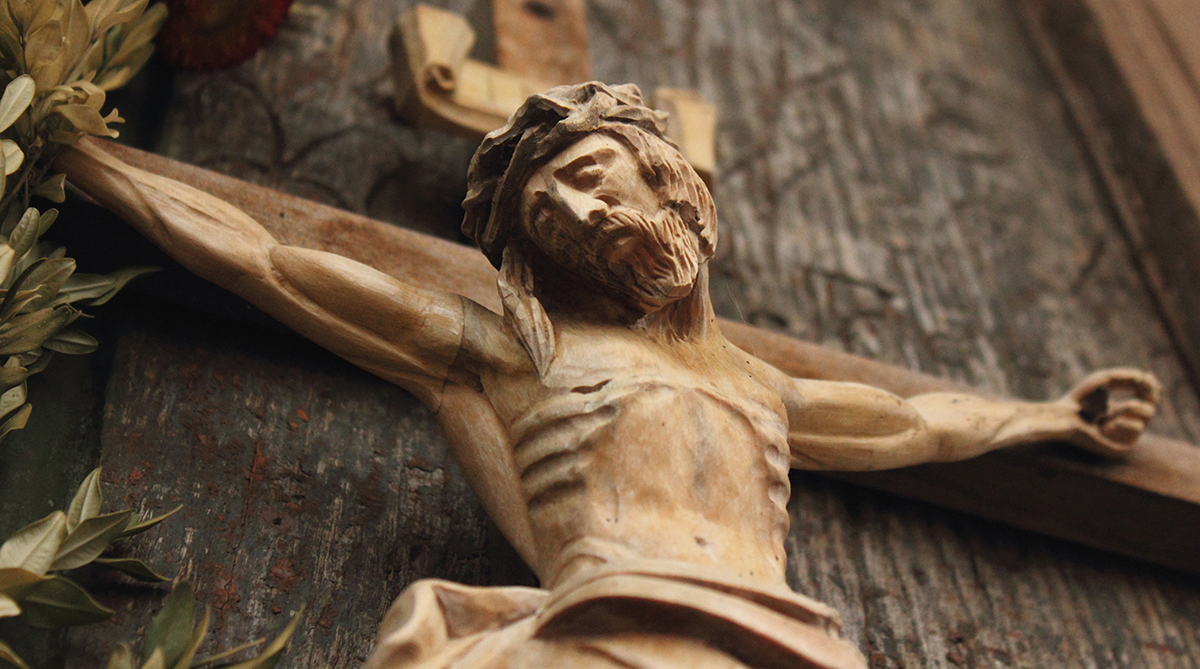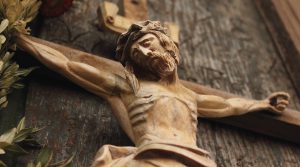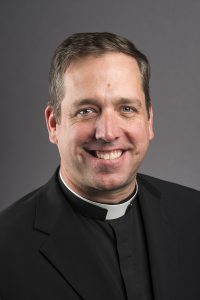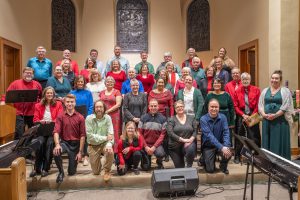
Jesus Christ crucified (an ancient wooden sculpture) (details)
By Laurie Stiegelmeier
By now many of us know Bishop DeGrood’s vision for the Diocese of Sioux Falls by heart: Lifelong Catholic Missionary Discipleship Through God’s Love. Each word in this statement carries great meaning but “through God’s love” is both the foundation and the capstone of the entire message.

The Merriam Webster Dictionary defines foundation as a basis upon which something stands or is supported, an underlying base, or a body or ground upon which something is built up or overlaid. Traditionally, a capstone was placed at the top of a pyramid or building to signify completion and to protect the walls below. Capstones were often considered the most important part of the building; they were elaborately decorated to signify the crowning of the achievement. One definition of capstone is “the high point, the crowning achievement.”
God’s love is the base upon which our lives are built and supported, the protection from storms and erosion, and the crowning achievement.
“God is pursuing us,” Father Scott Traynor, vicar for Lay and Clergy Formation and executive director of Broom Tree Retreat Center, says, pointing to the universal call to prayer as foundational. In paragraph 2567 of the Catechism of the Catholic Church, we read “the living and true God tirelessly calls each person to that mysterious encounter known as prayer. In prayer, the faithful God’s initiative of love always comes first; our own first step is always a response.”
Comparing God’s initiative of love and our response to a parent lifting their child in a game of airplane, Father Traynor says when the parent stops, the first words from the child’s mouth are “Do it again!”
“The attention, the play, is the child experiencing being loved. The first way we come to know God’s love is through the love of our parents,” he says. “‘I want more of it’ is our response to God’s love, or to the kindness, goodness or service shown to us that awakens a desire for more that can only be given by God.”
Discipleship, the call to follow Jesus Christ, is built on God’s initiative of love.
“Missionary discipleship is the process by which I encounter Jesus and experience his love for me. That leads me to make a decision to follow him and, motivated by his love, to help others to encounter, experience and choose to follow him,” Father Traynor says.
However, he cautions that if our motive is not because of God’s love, our efforts won’t be fruitful.
“We need to be motivated by God’s love for the person or persons as unrepeatable images of God, loved unconditionally by him,” he says.
Trust is key to discipleship
Father Traynor says discipleship begins with trust. Trust leads to curiosity which leads to openness, then to seeking, to encountering, and to deciding to follow Jesus.
“A maturing relationship is fueled by an ever-deeper encounter with Christ,” he says. “To build a culture of missionary discipleship, we need to provide repeated ways for people to encounter God.”

To do this, we need to get to know and understand people so we can tailor our discipleship to their needs, out of love for them. “Love seeks what is best for the beloved,” Father Traynor reminds us.
“For example, if a person has a lack of trust in God, religion or the Church, the most fruitful thing we can do is to be a loving human being to them—to show them goodness and kindness as a disciple of Christ,” Father Traynor says. “This may lead to curiosity, ‘Why are you being so kind to me?’ Openness and the other stages of growth leading to the decision to follow Christ may follow. We need to understand where a person is in their relationship with God in order to effectively help them take the next step closer to Christ and the Church.”
The necessary experience, Father Traynor says, is a lived experience of God’s love. “We need to long for it, pray for a whole new experience of God’s love. We need to recognize that this is what I’m made for. Every human being has a need for a deeper experience of God’s love which is freely given and freely received. We don’t need to earn it; God’s love is true love, unconditional and freely given—even though we may have experienced a contrary lesson from people in our lives. Seek, knock, and ask for it. Pray for others to receive God’s love; it is everyone’s central need.”
St. Paul understood this. In Ephesians 3:14-19, his prayer is for everyone to deeply feel the love of God for them: “For this reason I kneel before the Father, from whom every family in heaven and on earth is named, that he may grant you in accord with the riches of his glory to be strengthened with power through his Spirit in the inner self, and that Christ may dwell in your hearts through faith; that you, rooted and grounded in love, may have strength to comprehend with all the holy ones what is the breadth and length and height and depth, and to know the love of Christ that surpasses knowledge, so that you may be filled with all the fullness of God.”
Sin can get in the way
While a lack of trust in God, religion, or the Church can prevent us from experiencing God’s love, sin—our own and the sins of others—can also blind us to it.
“What every sin has in common is that in one form or another it is a turning away from God’s love. God can’t force us to love him; he waits for us to receive and respond,” Father Traynor says. “At the last supper Jesus commanded us to ‘love one another as I have loved you.’ We fail a thousand times a day to do that, but we must remember that everyone is commanded to love as Jesus loves. When people fail and we are mistreated or unloved, it causes pain which gives rise to fear and woundedness that can keep us from experiencing God’s love, responding to it, and loving others.”
Father Traynor explained that woundedness is caused by the opposites of love: hate (the total dedication of energy to destroy what is true, good and beautiful), selfishness (which manifests as walking away from commitment when it is difficult), consumerism, and self-seeking.
“These are opposite of what we admire in the saints who are generous, committed, sacrificial. These qualities and ability to love others as God loves us require his grace,” he says.
“A great help to grow in love is service—disinterested labor for the good of others,” Father Traynor says, adding that in tough cultural times, anything that exposes us to the true, good and beautiful, such as art, music and nature, can open us to receive God’s love.
Love is a gift of self
Love can be a vague idea. The word can be used casually, robbing it of its true meaning and making us willing to give and receive less than what is authentic. But Pope Saint John Paul II’s “Theology of the Body” gives us the beautiful gift of love defined as a sincere gift of self, given freely, totally, faithfully and fruitfully.
“We can see this in Jesus on the cross where he freely loved us,” Father Traynor says. “Remember he said in John 10:18 ‘No one takes it [my life] from me, but I lay it down on my own.’ It was a complete gift of self, faithfully unconditional because while sinless he died for sinners. And it was life-giving, fruitful, saving us from eternal death.”
This is how Jesus commands us to love one another as he loves us. It is how we are to love as missionary disciples: freely, totally, faithfully and in a way that leads to greater life. The fruit, the greater life, the crowning achievement—the capstone—is heaven.
“God created us for heaven, and heaven is not a spectator sport. It’s a full participation in God’s own love—the love of the Father, the Son and the Holy Spirit forever,” Father Traynor says. “The real measure (of our lifelong Catholic missionary discipleship) is if we are leading others to God’s love and heaven forever.”
“God’s love isn’t just a nice tagline for our diocesan vision,” Father Traynor summarized. “It’s like the fabric of a tapestry. It’s the fabric against which all the elements of lifelong Catholic missionary discipleship are stitched in place; it holds the rest of the vision together.”


